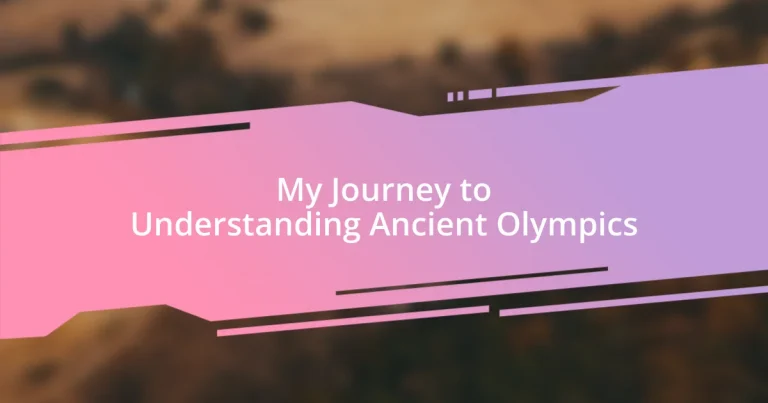Key takeaways:
- The Ancient Olympics, beginning in 776 BCE, served as a unifying force in Greece, fostering peace and showcasing human achievement amidst political strife.
- Key events like the stade (sprint), wrestling, and pentathlon highlighted the ideals of strength, skill, and versatility that still resonate in modern athletic competitions.
- The cultural significance of the Ancient Olympics included embodying Greek ideals, celebrating local pride, and mixing sport with spirituality, influencing contemporary views on athletics and social change.
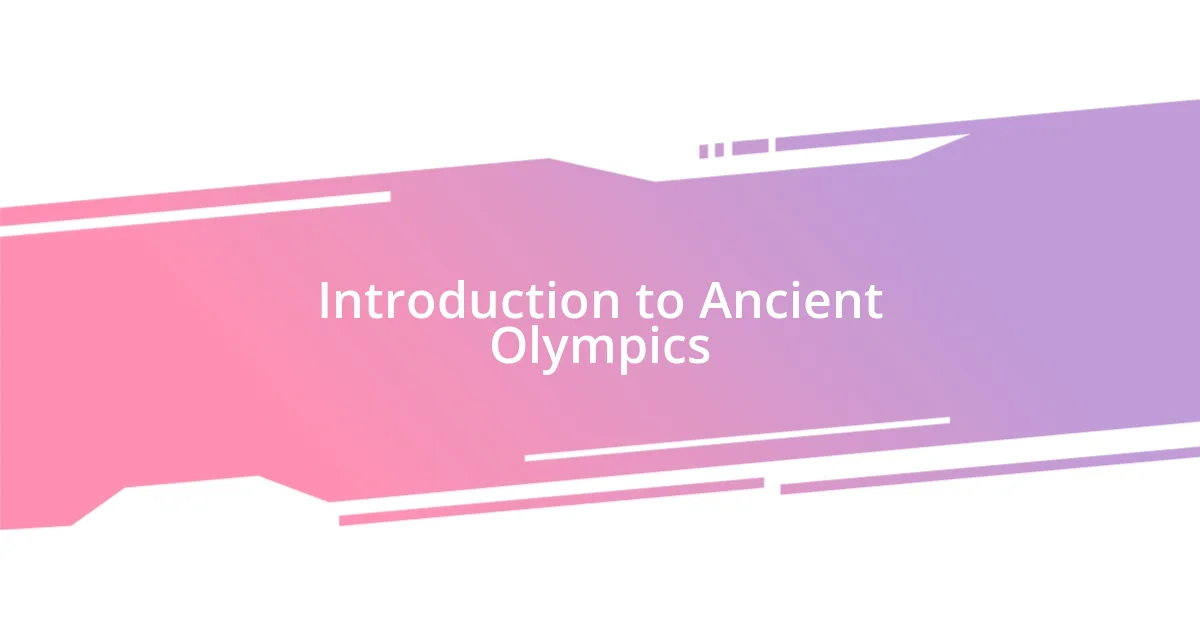
Introduction to Ancient Olympics
The Ancient Olympics, held in Olympia, Greece, were much more than a series of athletic competitions; they were a profound celebration of human spirit and culture. I often find myself marveling at how these games united city-states, creating a temporary truce during a time when conflict was rampant. Have you ever thought about how something as simple as a race could foster peace and camaraderie among fiercely competitive nations?
The first recorded Olympic games took place in 776 BCE, and they were dedicated to Zeus, the king of the gods. While studying these events, I felt a deep sense of connection with the ancient athletes who competed in the nude, embodying both physical prowess and the raw beauty of the human body. Isn’t it fascinating to consider how their dedication to training mirrored the struggles and victories we face in our lives today?
Over time, the Olympics evolved, introducing various events such as wrestling, boxing, and the pentathlon, showcasing the versatility and strength of the competitors. Reflecting on this, I often wonder how the values of competition and excellence have permeated our modern culture. What can we learn from these ancient games that can inspire our pursuit of personal and collective greatness today?
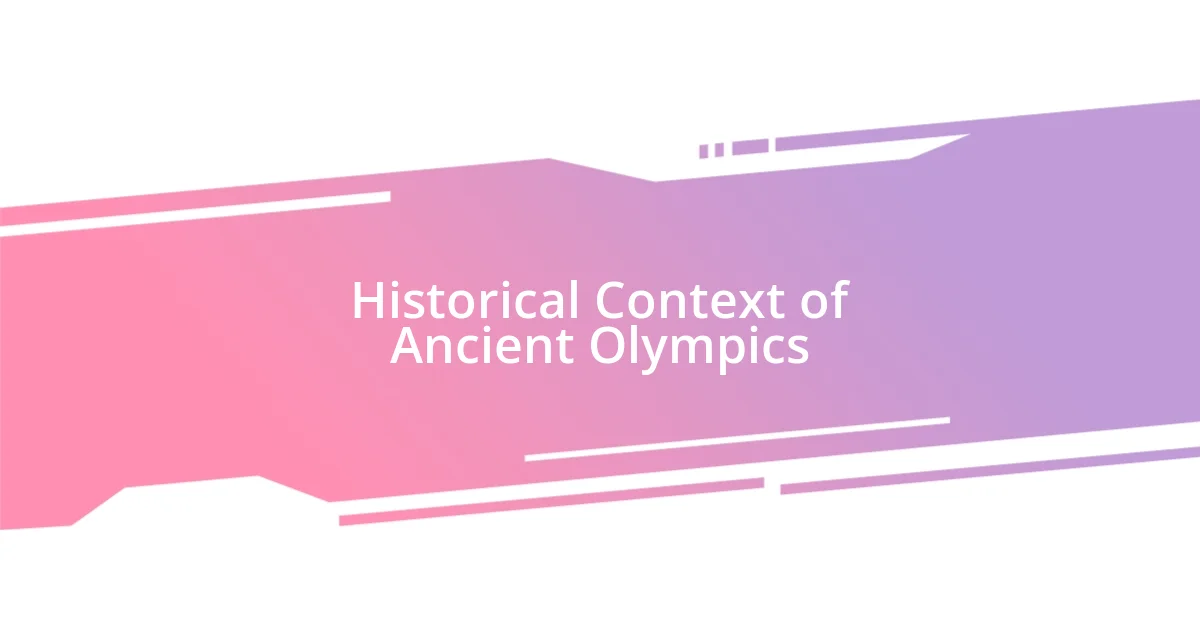
Historical Context of Ancient Olympics
When I dive into the historical context of the Ancient Olympics, I’m always struck by the unique societal landscape of ancient Greece. These games weren’t merely athletic events; they served as a critical unifying force during a time filled with political strife. It amazes me how, despite being surrounded by conflicts, the Greeks could come together, setting aside their differences to celebrate human achievement and spirituality.
- The Ancient Olympics began in 776 BCE and were dedicated to Zeus, symbolizing more than just athletic prowess.
- They fostered peace through the Olympic Truce (Ekecheiria), allowing travelers and athletes to safely move to Olympia.
- Competing city-states strained their relations during the games, yet they also found common ground, showcasing a profound cultural exchange.
- Athletes trained rigorously, embodying virtues like honor and resilience, which resonate with today’s principles of personal growth.
- I can’t help but think how these historic gatherings echo in our modern sports culture, where global events still foster unity and competition.
As I reflect on this, it fills me with a sense of admiration for the athletes of that era. They didn’t just compete; they represented their cities, their values, and their aspirations, all while history was being made. The more I learn, the clearer it becomes that the spirit of the ancient games can still inspire us today.
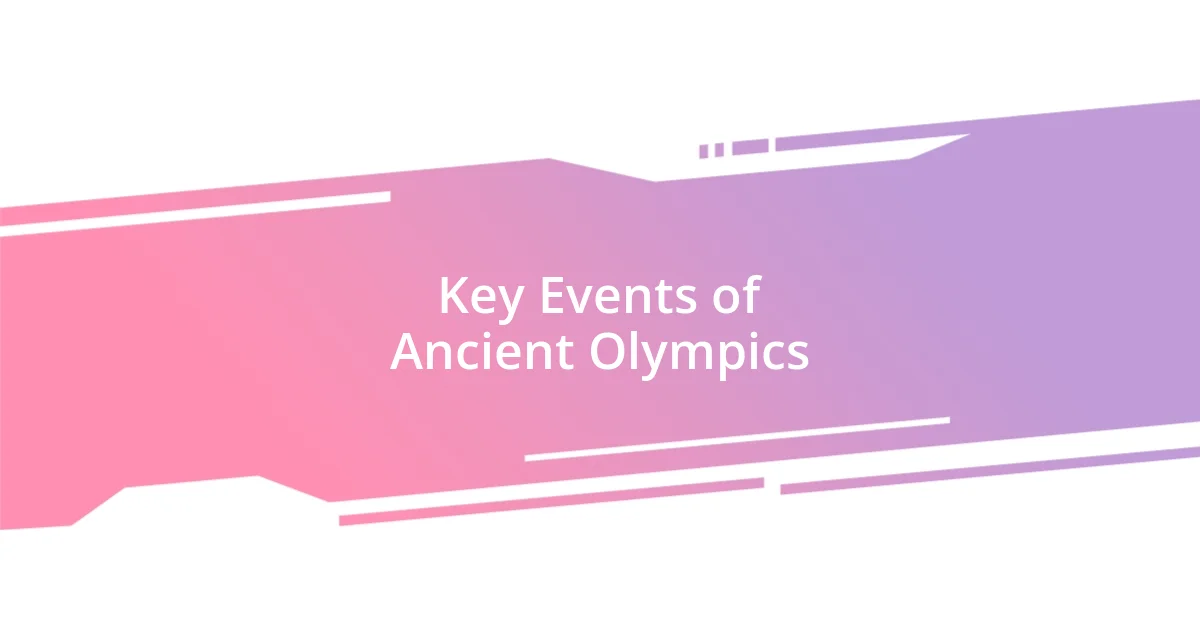
Key Events of Ancient Olympics
In the Ancient Olympics, key events that truly highlight the athletic spirit included the running events, wrestling, and the pentathlon. The sprint, known as the “stade,” was a significant event, where athletes ran approximately 192 meters in a show of speed and endurance. I can only imagine the adrenaline they felt, crossing the finish line, not just for personal glory but for the pride of their city-state. Doesn’t that resonate with our modern races, where every heartbeat counts?
Wrestling was another cornerstone of the Olympics, symbolizing skill, strategy, and strength. It’s intriguing to think about how this ancient sport required not just physical might but also mental agility, much like the challenges we face today in both sports and life. A personal encounter I had at a local wrestling match reminded me of this connection. The grappling athletes displayed not just their physique but also their intellect in reading their opponents, a lesson in both sportsmanship and life.
Lastly, the pentathlon stands out as a true test of versatility and prowess, incorporating running, jumping, discus throw, javelin throw, and wrestling. A blend of strength and technique, it captures the essence of what it means to be a well-rounded athlete. Reflecting on my own experiences in multi-sport activities, I often feel that same rush of excitement and struggle that the ancient pentathletes must have faced. How remarkable it is that their spirit of competition and resilience continues to inspire us in our diverse athletic endeavors today!
| Event | Description |
|---|---|
| Stade (Sprint) | A race of approximately 192 meters, showcasing speed. |
| Wrestling | A crucial competition focusing on strength, skill, and strategy. |
| Pentathlon | A diverse event including running, jumping, discus, javelin, and wrestling. |

Famous Athletes in Ancient Olympics
The athletes of the Ancient Olympics are fascinating figures that capture my imagination. One of the most revered was Milo of Croton, a wrestler known for his incredible strength. Legend has it that he carried a cow on his shoulders and consumed immense amounts of food daily. Can you picture the awe he must have inspired among spectators? That kind of physical prowess and dedication isn’t just remarkable; it serves as a testament to the lengths which athletes will go to achieve greatness.
Then there’s Leonidas of Rhodes, who excelled in running events. He is celebrated for winning multiple crowns in the same Olympic games. It’s hard not to feel a rush of admiration when I think about how he must have felt sweeping victory after victory, each one symbolizing not just personal triumph, but the honor of his city. Have you ever experienced such a moment in your own life? It’s easy to draw parallels between that sense of achievement and our own victories.
Lastly, we can’t forget about the legendary charioteer Apheltates. He claimed victory not just as an athlete but as a symbol of wealth and status. The significance of his victories went beyond the racetrack, showcasing the intricate relationship between sports and society. It makes me ponder: how much do our own sporting heroes influence our culture today? Just as Apheltates captured history on and off the field, contemporary athletes shape modern narratives in ways that reflect our values and aspirations.
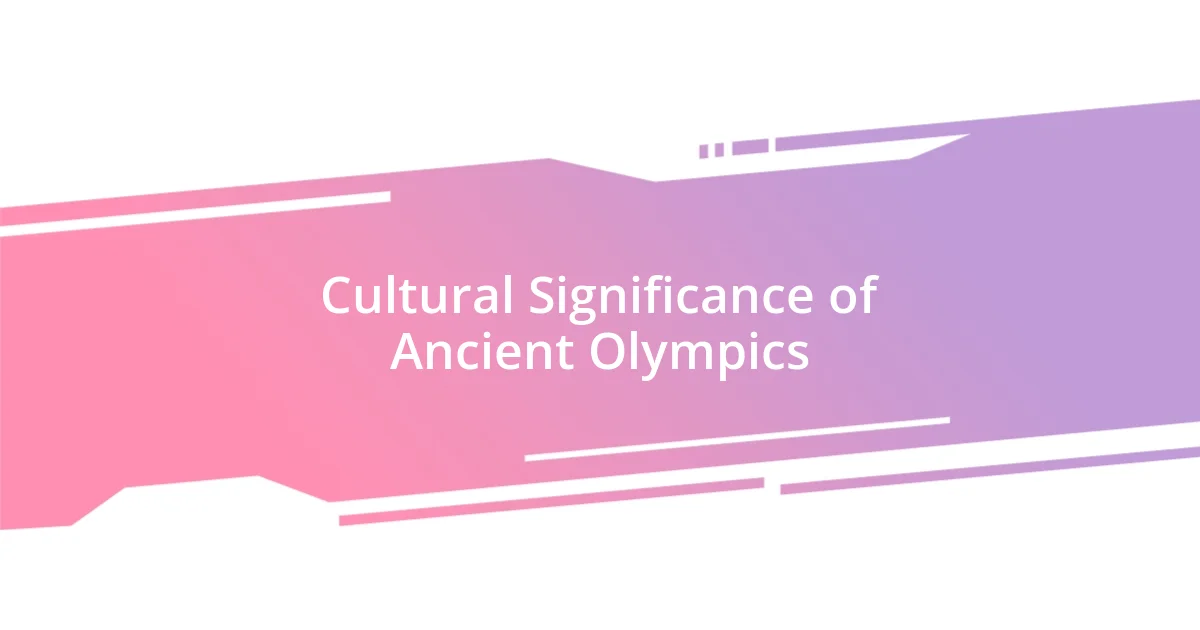
Cultural Significance of Ancient Olympics
The Ancient Olympics held profound cultural significance, intertwining sports with the identity of Greek city-states. I find it fascinating that these games weren’t merely athletic contests; they were a festival of unity and competition. The athletes represented their cities, creating a sense of pride that resonates with the way local teams still ignite community spirit today. Have you ever cheered for a local sports team and felt that rush of connection?
Moreover, the games served as a platform for showcasing what it meant to be Greek. Athletes embodied the ideals of strength, discipline, and honor—values that were revered throughout ancient society. I remember attending a community sports event where athletes competed not just for medals, but for personal improvement and community recognition. It struck me how similar that motivation is to what the ancient Greeks must have felt. Isn’t it interesting how sports can transcend time and culture, connecting us through shared human experiences?
Lastly, the Ancient Olympics were a sacred event dedicated to Zeus, reinforcing the deep-seated spiritual beliefs of the time. Observing such reverence for both sport and religion reminds me of modern-day tributes at major athletic events, where we honor our heroes and express gratitude for their achievements. When I witness an athlete give thanks before a competition, I can’t help but appreciate how the legacy of the Olympics continues to inspire humility and gratitude among competitors. How powerful it is to think that the marriage of sport and spirituality has perennial relevance, echoing through ages!
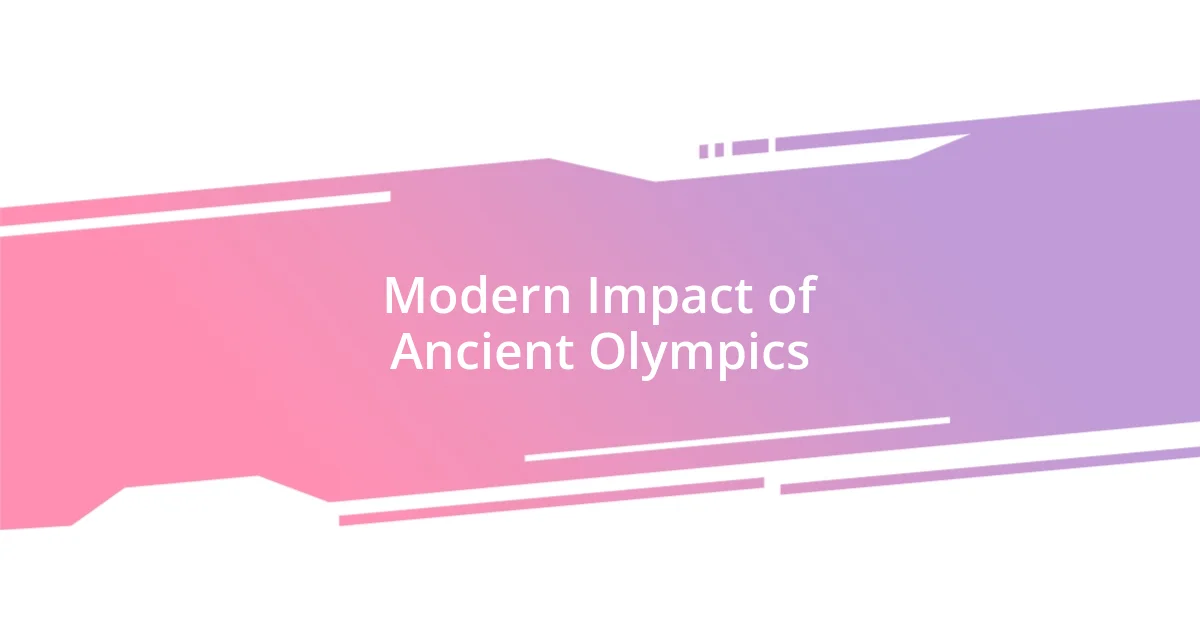
Modern Impact of Ancient Olympics
The modern impact of the Ancient Olympics can be seen in how we celebrate athleticism and competition today. I often think about the passion that athletes bring to their events, much like the Olympians of ancient times, who competed not just for medals but for honor and glory. When I watch the Olympics, I can’t help but feel a sense of connection to that historical narrative, as if I’m part of a continuum where resilience and dedication are timeless values.
Furthermore, the concept of the Olympics as a unifying event echoes through time, inspiring events like the Pan American Games and the Commonwealth Games. I remember attending the Pan American Games and feeling the thrill of different nations coming together, much like the ancient city-states. It struck me how these modern gatherings create a spirit of camaraderie that can transcend cultural differences—an echo of what was once celebrated in ancient Greece. Isn’t it remarkable how a shared love for sports can foster goodwill and collaboration among diverse communities?
Lastly, the Ancient Olympics laid the groundwork for how we view sports as a platform for social change today. Modern athletes often use their visibility to advocate for important issues, just as ancient athletes were celebrated figures in their societies. I recall a moment when a contemporary athlete bravely spoke out against injustice during a medal ceremony. The power of their words resonated with me, reminding me that the essence of sportsmanship isn’t just about victory, but also about using one’s platform for the greater good. How different yet strikingly similar that connection feels to the legacy of those early Olympians, who also stood as representatives of their culture and values!
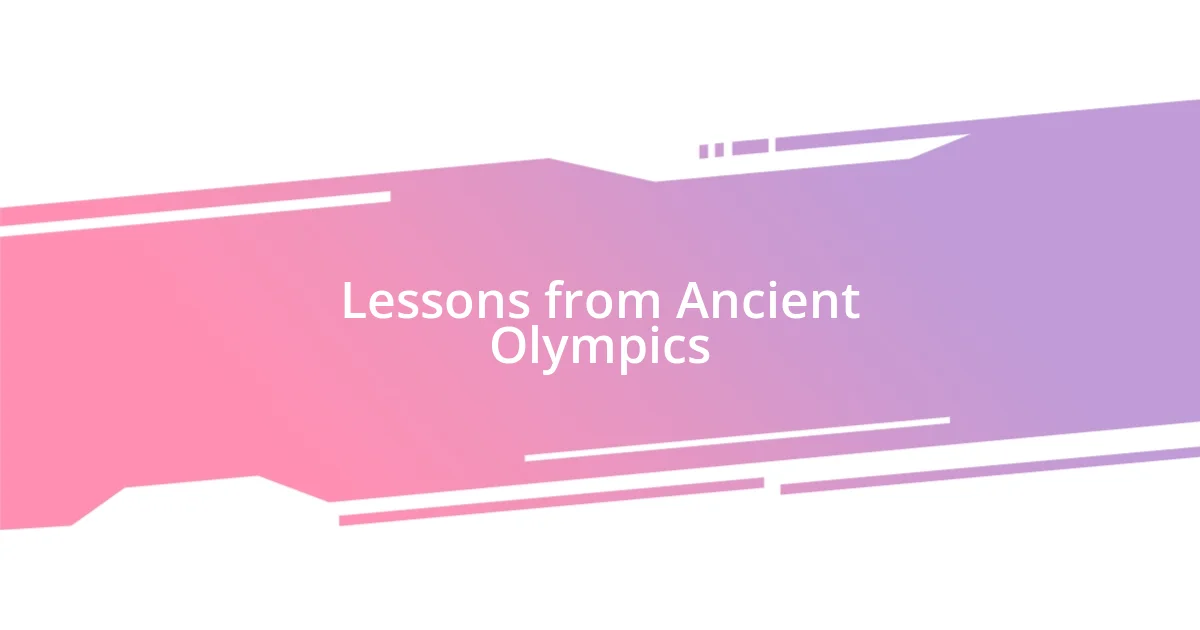
Lessons from Ancient Olympics
Lessons from the Ancient Olympics remind us about the importance of perseverance and personal excellence. When I reflect on the commitment athletes displayed while training for those games, I recall my own experiences in competitive sports. Each early morning practice and overcoming setbacks felt like a mini-Olympics for me. Don’t you think that perseverance in pursuit of personal goals is a lesson we can all embrace?
Another striking lesson is the value of fair competition. Athletes in ancient Greece adhered to strict rules and values of sportsmanship, which I’ve seen mirrored in my own experiences in team sports. There’s truly something special about competing with integrity, knowing that winning is satisfying only when it’s earned. Have you ever celebrated a hard-fought victory knowing that everyone gave their best? That’s the essence of true sportsmanship.
Lastly, the sense of community forged through the Ancient Olympics is a lesson I deeply appreciate. Being part of a team is akin to the camaraderie found among those ancient competitors. I remember the time when my team came together to support one another during a tough tournament, and it felt as powerful as that collective pride of representing a city-state. Isn’t it wonderful how shared experiences in sports can bind us together, echoing the unity seen in those ancient gatherings?












